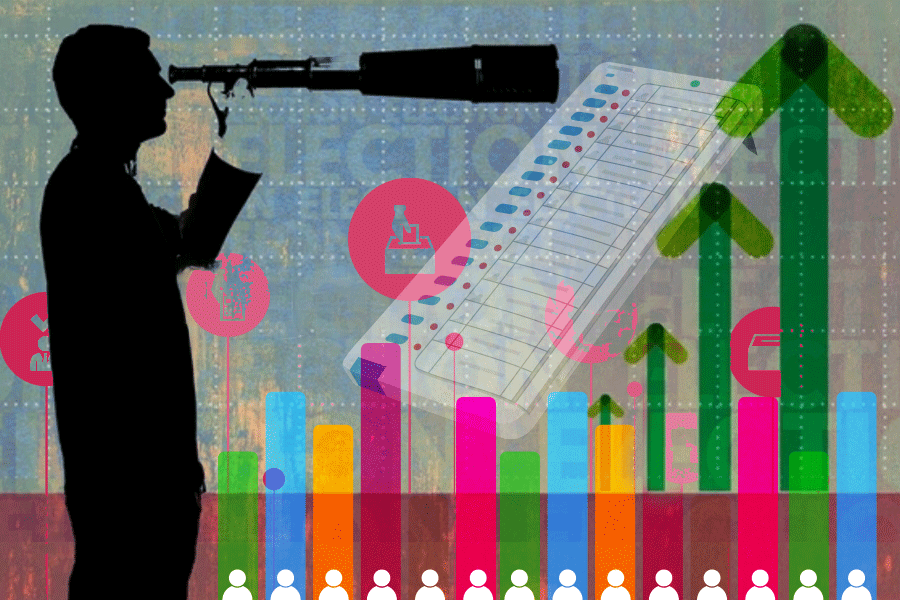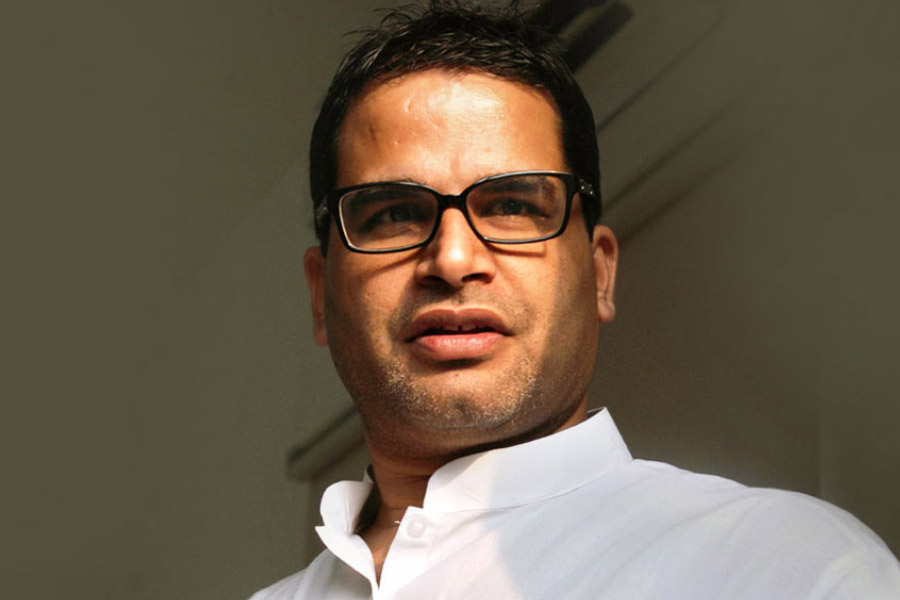India’s top pollsters are dining on humble pie. They’re struggling to explain why their predictions that the BJP-led NDA alliance would clinch way over 300 seats – and possibly even 400 – were so wildly incorrect.
Their predictions after polls closed plunged the Opposition into deep gloom and also set the stage for a stock market boom, one day before counting actually took place.
“We humbly accept that we failed to predict the estimated seats which the parties will win,” says Pradeep Gupta, Axis My India CEO, who was so affected by his poll failure that he broke down in tears on live TV.
“Yes, I and pollsters like me got it wrong. I am ready to eat humble pie,” pollster Prashant Kishor declared on India Today TV. Kishor had been one of the loudest voices in recent months predicting the BJP would score a runaway win and capture up to 400 seats. .
Kishor, who’s declared his aim of getting into politics, says he was wrong to attempt precise predictions for this election. “I won’t get into the number of seats in elections any more,” he declares.” C-Voter’s Yashwant Deshmukh reckoned the BJP would grab 316 seats and its allies would collect another 50. The final count was, of course, way lower with the BJP at 240.
The other opinion polls also came up with much the same numbers. News 24-Today’s Chanakya estimated that the ruling NDA alliance would capture around 400 seats with plus or minus 15 either way. The NDTV-Jan Ki Baat poll also forecast close to 400 for the NDA. India TV-CNX was also in the same vicinity with 386 plus or minus 15. Today’s Chanakya admits they got it wrong, saying: “We failed to gauge this Lok Sabha 2024 election. We sincerely apologise to all our friends and well-wishers."
Only DB Live predicted the INDIA Alliance would come out in front with around 275 with the NDA far behind at 221 plus or minus 20. But the poll got the numbers wrong for many states.
So what exactly did go wrong? The pollsters insist that their numbers weren’t as bad as they look at first glance. They place the blame squarely on three states that sent their calculations flying out of the window. Unfortunately, these states just happened to be three of the country’s biggest – Uttar Pradesh, Maharashtra and West Bengal – with 170 seats between them.
“We humbly accept that we couldn’t rightly predict seats for Uttar Pradesh, Maharashtra, and West Bengal which impacted the overall tally,” says Gupta.
Deshmukh, on a similar note says: “I flunked into two places. In UP I gave 65 (to the BJP) .” In Maharashtra, which has 48 seats totally, C-Voter predicted that the BJP’s numbers would fall from 41 in 2019 to between 28-30 seats this time round. In the event, the BJP and its allies crashed precipitously, getting only 18 seats. “In Maharashtra, I have been saying for the last 18 months that it would not go well. The mandate was insulted and the voters got very angry,” says Gupta.
In West Bengal too, it was widely believed that Mamata Banerjee and her Trinamool Congress (TMC) would lose a few more seats from the last time round and the BJP would add to its 18 it already had. The pollsters and the general public were startled when the TMC got 29 seats and the BJP dropped six seats falling to 12.
The pollsters take the plea that West Bengal is a tough state to survey because of what they call the “fear factor” triggered by the history of political violence. Says Gupta: “WB is a difficult state to survey and there is a certain amount of fear factor along with a history of political violence because of which people don’t reveal their political choice, comfortably. This ‘silent voter’ is a big factor when predicting elections in the state and affected our estimates.”
Deshmukh echoes Gupta on West Bengal: “Wherever there is political violence or communal violence the response rate goes down. People do not say anything against those who they fear.”
Gupta argues that Maharashtra became more difficult than usual because the two alliances both polled around 44 per cent. Additionally, he argues that minute shifts changed the seat share pattern totally. “The 1-2% vote share shift of Prakash Ambedkar’s party VBA in Vidarbha to the INDIA alliance impacted the overall results in the state. This was a major factor in the ability to get the right prediction.”
Shift to Rajasthan and a different factor comes into play. The BJP was far ahead in terms of voting percentage (50 per cent to 37 per cent) but it still lost eight seats to the Congress much to the surprise of the pollsters.
In their defence the pollsters point out that they got 27 out of 30 states right. Says Gupta: “We rightly predicted 27 states with a fair accuracy or with a maximum difference of 1-2 seats.”
On a similar note, says Deshmukh: “Of the 30 universes that we have in India, I got 27 bang on.” He adds: “In the other three I got the vote share bang on but I could not get the seat share right.”
Could there have been political sabotage, particularly in states like Uttar Pradesh and Rajasthan? The pollsters insist they can’t capture that in their data. Rumours are currently doing the rounds that there was infighting in the BJP that affected its performance, particularly in UP.
One pollster points out that all the states around Uttar Pradesh voted for the NDA alliance. That includes Madhya Pradesh, Bihar, Himachal Pradesh, Uttarakhand.However, the CSDS-Lokniti poll – which only assesses vote share and doesn’t offer a precise seat count – reckons that in Uttar Pradesh the upper castes voted solidly for the BJP alliance (it got 79 per cent and 16 per cent went to the INDIA alliance). Muslims and Yadavs voted in large numbers for the INDIA alliance. About 82 per cent of Yadavs voted for the BJP and 92 per cent of Muslims. Axis My India’s Gupta also admits errors in Uttar Pradesh. “We also acknowledge that for various reasons we were not able to predict the shift of the SC votes from BJP & BSP to the INDIA alliance at an accurate level. This shift of vote share was so significant that it impacted 25 out of the 80 seats in UP.”
Indian exit pollsters have had their ups and downs. In 2023 Axis My India had a huge triumph because it got the Karnataka state election numbers right. But back in 2004, they failed to see the Congress upset of the BJP. In 2009, they predicted a hung parliament but the Congress roared back to power. In 2014, they foresaw the triumph of the BJP but underestimated the size of the party’s win. In 2019, the exit polls again underestimated the extent of the BJP victory.
Pollsters blame difficulties in getting an accurate sample size in the vast country of 2.4 billion. Critics also say the exit poll findings can be politically motivated.
Nevertheless, there’s no question 2024 will go down as an election in which the pollsters got it badly wrong. It could be argued they weren’t terribly off the mark in the sense that the BJP still stayed in power as the pollsters had predicted.
Gupta insists that, “Over the past 11 years, Axis My India has consistently achieved a remarkable 93 per cent accuracy in the exit poll results rightly predicting 65 out of 69 elections including many outliers.”
What about the question of the stock market? The Election Commission should offer an explanation of why counting didn’t take place on Monday when polling had ended on Saturday evening. Rahul Gandhi has called the one-day pre-counting boom and the subsequent massive crash on the day of the results “the biggest-ever stock market scam” and demanded a parliamentary inquiry. He has also questioned why both Prime Minister Narendra Modi and Home Minister Amit Shah were so avidly pushing investors to buy shares, telling voters that the market would “break records” before the election results.
The pollsters insist that the one-day stock market surge was not their fault. Says Gupta: “We would like to highlight that our studies have nothing to do with the stock market at all.”












